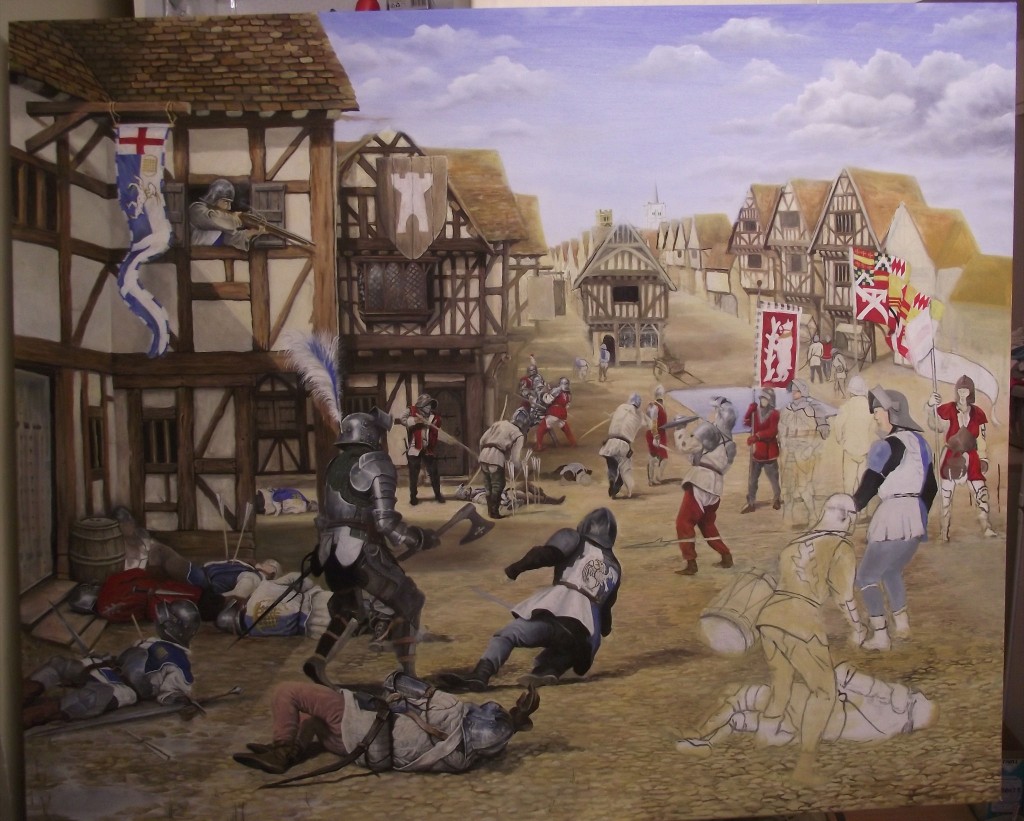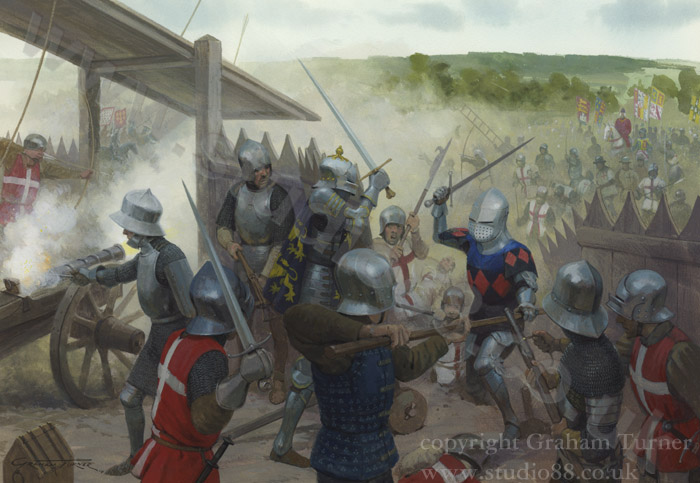 |
| First Battle of St. Albans depicted by Matthew Ryan |
The 'Cousins War' or 'War of the Roses' fought between England's nobility began in earnest at St. Albans on 22 May 1455.
BACKGROUND
Henry VI's mental breakdown after heavy English defeats in France in 1453 brought the need for governance and Richard, Duke of York, became Protector of the Realm on 27 March 1454.
York had held grievances with Edmund Beaufort, 2nd Duke of Somerset, ever since the king decided to make Somerset Lieutenant of France in 1448 instead of granting a third term to the incumbent York.
 |
| Battle of Castillon of 1453 depicted by Graham Turner |
Somerset's term in office was disastrous, with the heavy defeat at the Battle of Castillon in 1453 leaving Calais as the only English territory in mainland France. York had previous animosity to Somerset's father when the king had shown favouritism towards the 1st Duke of Somerset by granting him, and not York, much needed troops in France 10 years earlier.
York charged the 2nd Duke of Somerset for failing to assert England's authority in France and imprisoned him in the Tower of London. But Somerset was soon to be freed when Henry VI recovered in late 1454. Henry VI continued to antagonise York by removing him as Captain of Calais and replaced him with Somerset.
The king summoned the meeting of the Great Council in Leicester and York viewed this invitation cautiously. York met with his loyal commanders, Neville father and son, Earl of Salisbury and Earl of Warwick, and decided to march south with a growing force to meet the king before he arrived at Leicester.
York sent word to Henry VI and the Archbishop of Cantebury of his intentions to not harm the king due to his faith and allegiance but took up arms to counter the "sinister, malicious and fraudulent" members of government.
BATTLE
Henry VI's army of 2,000 troops arrived at St. Albans first on 22 May 1455 and encamped along Tonman Ditch. The 7,000-strong Yorkist army arrived and made camp in Keyfield to the east of the barred town. Negotiations lasted three hours but broke down when York's demands of Somerset's surrender were denied.
York led the surprise attack on the town before noon but was repulsed at the barricades by Lord Thomas Clifford and his men. Warwick outflanked the Lancastrians by rushing through the gardens between Key Inn and Chequer Inn and attacked Clifford's men from behind.
The battle through the streets of St. Albans lasted around half an hour as the Lancastrian rank and file deserted their nobles. Somerset, Clifford and Henry Percy, Earl of Northumberland, lay dead.
Humphrey Stafford, Duke of Buckingham, sought sanctuary in the town's abbey after being hit in the face by an arrow and the Yorkist archers struck the king in the neck. Henry VI was left alone in St. Peter's Street and the king sought refuge in a tradesman's house until he was discovered by York.
 |
| Duke of York is told of Henry VI's whereabouts depicted by Graham Turner |
York declared his faith to the crown and was ready to show the king his devotion with his men at any time. The king was escorted back to London and took up residency at the palace of the Bishop of London.
York declared himself Constable of England and made Warwick Captain of Calais. Henry VI had another bout of mental illness during his imprisonment and York became Protector of the Realm once again.
Henry VI recovered in February 1456 and York resigned his office of Protector. The king now accepted York's influence at court and allowed Warwick to keep his command of Calais. Henry VI showed faith in York by reinstating him as Lieutenant of Ireland and sent York to the Scottish border to defend against a possible invasion.
Warfare is a fascinating subject. Despite the dubious morality of using violence to achieve personal or political aims. It remains that conflict has been used to do just that throughout recorded history.
ReplyDeleteYour article is very well done, a good read.
Thank you Gerald. The personal conflicts and animosities of this battle would violently ripple through the following decades. I'm glad you enjoyed the read.
Delete